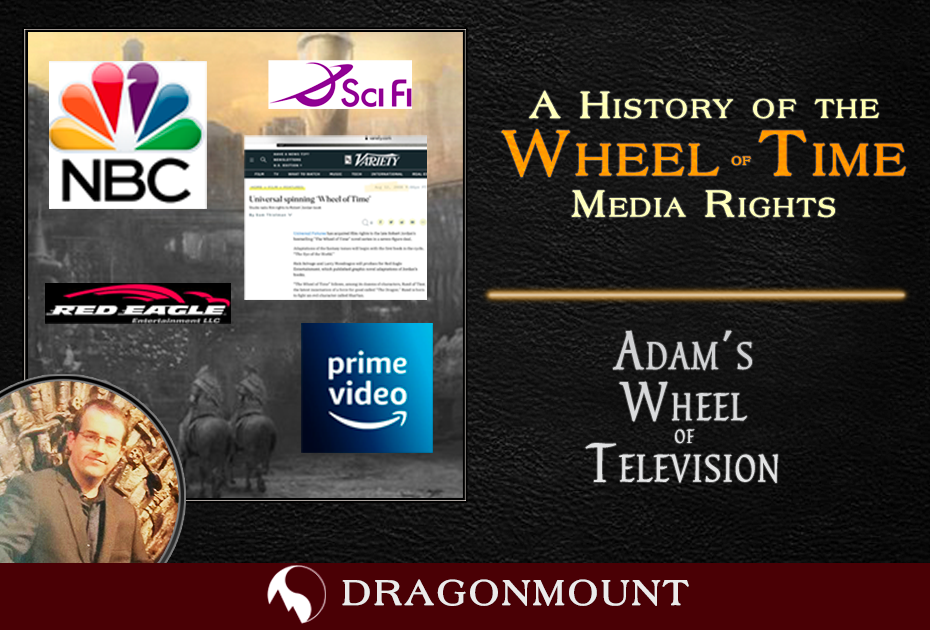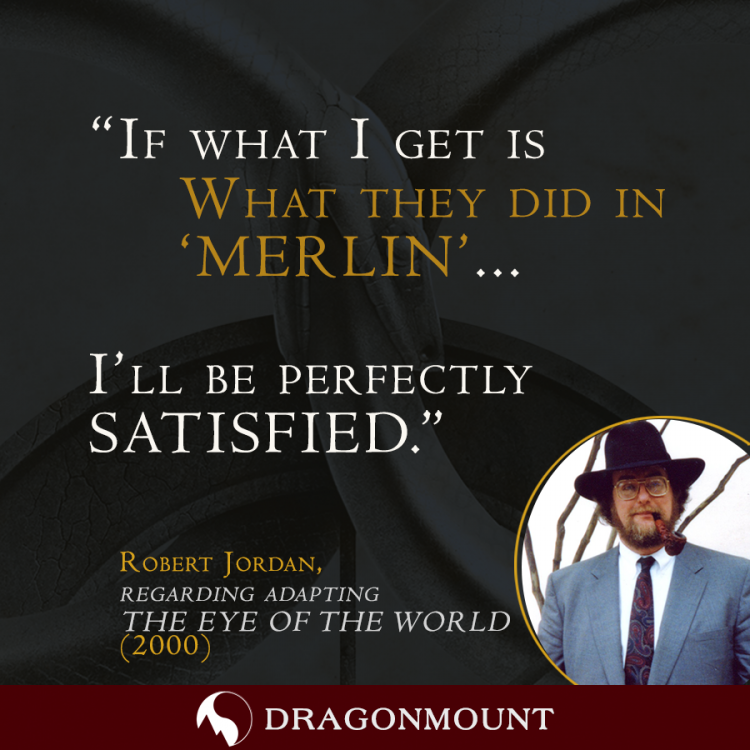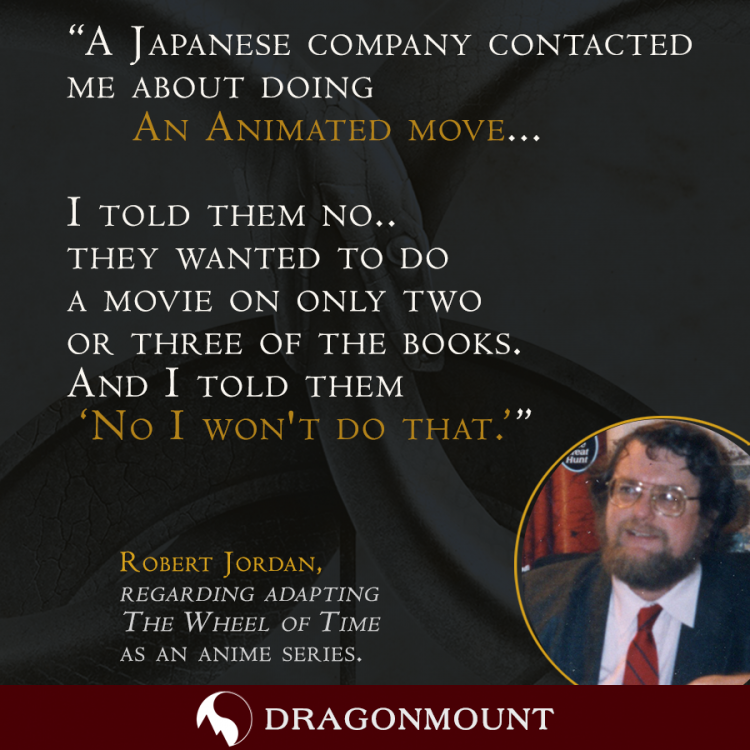
Adam Whitehead is Dragonmount's TV blogger. Adam has been writing about film and television, The Wheel of Time, and other genre fiction for over fifteen years, and was a finalist for the Hugo Award for Best Fan Writer in 2020. Be sure to check out his websites, The Wertzone and Atlas of Ice and Fire (including The Wheel of Time Atlas!) as well as his Patreon.
It’s been two years since Amazon ordered The Wheel of Time to series, ending a long wait for fans who'd been wanting to see their favourite series picked up for the screen. That wait began on 15 January 1990 when the very first readers to finish The Eye of the World put the book down and said, “This would make a good movie, wouldn’t it?”
Such a long wait for such a hugely popular property to be adapted is unusual. The first Harry Potter film hit screens barely four and a half years after the first novel was published, and The Lord of the Rings got a BBC radio adaptation just two years after the book came out (and “only” twenty-three years for the first animated film version). Game of Thrones was optioned by HBO only ten years after the first book was published, although actually getting it on screen turned out to be an arduous task taking another five years after that point. Fans may be forgiven for asking why it took so long - thirty-one years by the time it airs - for someone to adapt what was, for most of its lifespan, the biggest-selling epic fantasy series since Tolkien.
The answer is that there’s actually been several attempts to bring the books to the screen before, some of them getting quite far and having quite a lot of money spent on them before the plug was pulled. Here’s the lowdown on a few of those attempts:
NBC
The American network NBC optioned The Wheel of Time for adaptation in 1999. Several network executives were fans of the books and – more to the point – of their massive runaway sales success which had already seen it score a New York Times #1 bestseller position (the first of six) and over 40 million sales by that point. The executives were enthusiastic and – for the time – highly ambitious, envisaging adapting each novel or perhaps several novels as mini-series in their own right, adapting the entire saga across several years. The initial plan was for a six-hour adaptation of The Eye of the World.
Their model was the 1998 mini-series Merlin starring Sam Neill (no relation to the 2008-12 BBC TV series), which adapted the Arthurian legend across three hour-long episodes costing more than $10 million each. The mini-series had concept art from legendary Tolkien artist Alan Lee (who would decamp to New Zealand the following year to help Peter Jackson shoot The Lord of the Rings) and a surprising degree of historical fidelity to the likely post-Roman, pre-Saxon setting of the stories. The casting director even tipped his hat to other Arthurian adaptations, by reusing castmembers from John Boorman’s 1981 film Excalibur. The mini-series also had an exemplary cast, including Miranda Richardson, Isabella Rossellini, Helena Bonham Carter, Rutger Hauer, James Earl Jones and Sir John Gielgud. NBC even tapped some of the writers of Merlin to possibly work on Wheel of Time.
Here's an audio clip of Robert Jordan talking about this adaptation effort, saying, “If what I get is what they did in Merlin, I’ll be perfectly satisfied.”
In a similar vein to the Merlin project was Dune, a mini-series which aired on the Sci-Fi Channel (about to return to NBC’s ownership at the time) to great success in 2000.
Alas, the Wheel of Time project at NBC was not to be. It foundered for several reasons (one imagines the sheer cost, the huge scale of the project and the fact that the books were not complete were all contributory factors), but the main one was that the executives backing it moved on from NBC by the end of 2000 and interest at the network dried up. They allowed the rights to revert to Robert Jordan.
Quote“I'm waiting for some contracts to catch up with me which are an option by NBC to do a mini series based on The Eye of the World with the screen writer who did NBC's Merlin. Now that's an option. It might happen, it might not happen. That's the only movie or TV activity going on.” – Robert Jordan, August 1999
Anime
Around the same time, a Japanese animation company – the identity of which has never been disclosed – contacted Robert Jordan to discuss the rights. Although Jordan had always envisaged a live-action adaptation, he was certainly not opposed to the idea and entered into discussions. Japanese animation studios are not unused to long-running adaptations and the use of animation would allow them to overcome the budgetary problems with effects and prosthetics that were daunting those interested in a live-action project.
Japanese animation studios are also well-used to the problem of adapting incomplete works. Bones Inc. produced a 51-episode adaptation of Hiromu Arakawa’s manga Fullmetal Alchemist in 2003-04, but the manga was not yet complete, so they made up their own ending. Five years later, after the manga was finished, Bones made a completely new adaptation from scratch called Fullmetal Alchemist: Brotherhood which adapted the entire manga very faithfully.
Unfortunately, the Japanese animation studio involved did not propose anything so ambitious. In fact, their proposal was that they would adapt only the first three books – The Eye of the World, The Great Hunt and The Dragon Reborn – and then adapt the ending of the third book into an ending for the entire story (so presumably the battle at the Stone of Tear would become the Last Battle, with Rand’s defeat of Ba’alzamon becoming the final defeat of the Dark One). They also seemed to be envisaging a single feature film to tell this story rather than a full TV series. Robert Jordan was rather bemused by this notion and turned the project down.
Quote“A Japanese company contacted me about doing an animated movie. I told them no, because they wanted to do a movie based on two or three books, and I said, "no, I won't do that". I would not support anyone doing a feature film of, say, The Eye of the World. I do not think it could be compressed into three hours. Certainly not into two. That would make it incomprehensible.” – Robert Jordan, April 2001
Red Eagle & Warner Brothers
In 2003 Robert Jordan sold an option for the books to Forsaken Films, who wanted to get the books on screen at either HBO or the Sci-Fi Channel. This was moving to capitalise on Sci-Fi’s success with the Children of Dune and Battlestar Galactica mini-series that aired that year (the latter leading to a long-running regular series). However, after a risible response to Sci-Fi’s (absolutely awful) Earthsea mini-series the following year, Sci-Fi’s interest in adapting original SF or fantasy novels dried up.
Forsaken Films was founded by Wheel of Time fan and budding film producer and director Eben McGarr specifically to adapt the Wheel of Time property. They partnered with DZYNZ Inc., a visual effects company who were working on Team America: World Police, to produce possible ideas for a mini-series project (presumably not using puppets!). DZYNZ’s owner, John Naulin (an industry veteran who’d worked on the Star Wars franchise, as well as Honey, I Shrunk the Kids) brought on board Larry Mondragon and Rick Selvage to advise on the project. After some months developing the property there was a re-organisation, with Naulin, Mondragon and Selvage founding Manetheren LLC to develop the film and then a parent company, Red Eagle Entertainment, to oversee a wider rights-handling project.
In March 2004, Red Eagle struck a larger deal with Jordan that superseded the deal with Forsaken (who promptly left the picture altogether). This was for rights-handling rights, including comic books and video games, for The Eye of the World alone. The price paid was $35,000 which, given the popularity of the series, was an incredible deal. This deal was extended several times until early 2008, by which time Red Eagle had paid an additional $130,000 to secure an option on the entire series. Then in May 2008 Red Eagle exercised the option, purchasing the film rights to the entire series for $465,000 on a deal that required them to have a project released by 11 February 2015.
Almost immediately Red Eagle ran into problems by pairing with redoubtable comic book company Dabel Brothers in producing first a limited series based on New Spring and then a longer comic series based on The Eye of the World. Both projects were beset by unexpected delays, controversies and unrealistic timescales (Dabel Brothers had form for this on several earlier projects, it has to be said).
The comic book furore was so notable that Robert Jordan took time out of his medical treatment to make his displeasure with the situation clear. Unfortunately, just a month later, Robert Jordan passed away.
As early as 2004 Warner Brothers showed an interest in a film project based on the books, possibly to bolster their fantasy film portfolio which also included the Harry Potter and Lord of the Rings franchises. However, after some speculative development work was done, Warners passed on the project. It was around this time that they began spinning up the work that later led to the Hobbit movie trilogy, and may have chosen not pursue that and not muddy the waters with a superficially similar fantasy project. This Wheel of Time project was dead by 2006.
Universal Studios
Red Eagle continued to develop the property and in August 2008 it was announced that Universal Studios had bought an option with a plan to develop the first book in the series, The Eye of the World, as a high-budget feature film. Film producer Jeff Kirschenbaum was put in charge of the project and spent time developing it with writer Chris Morgan (the Fast and the Furious franchise, as well as 47 Ronin, Wanted and the long-gestating Legend of Conan movie with Arnold Schwarzenegger), but they were sidetracked when the Fast and the Furious movies started blowing up in a big way and refocused on those. Other writers came on board, but no-one could get a script in place that they liked. (Disclosure: Dragonmount founder Jason Denzel also contributed to the project at the time).
Kirschenbaum left Universal and Universal’s interest in the project dried up. Red Eagle noted the pivoting of the industry towards television and re-pitched the project as a TV series, which ironically brought the property back to the attention of NBC and the Sci-Fi Channel – now called SyFy – as they were owned by Universal. After a brief perusal of the idea, the two networks passed. Normally you’d expect the biggest post-Tolkien, non-Rowling fantasy series in the world to attract more interest (especially since the prices involved seemed to be pretty low), but this process was coinciding with the biggest economic downturn the world had seen in seventy years and the project fell foul of Universal’s sudden reticence to commit to anything other than proven franchises. Although there were flickers of renewed interest at the studio after Game of Thrones (which began airing in 2011) hit the big time, Universal’s film option had finally expired by February 2014.
In the meantime, Red Eagle continued to develop the video game project. In February 2010 they announced they were partnering with Obsidian Entertainment, the developers of Fallout: New Vegas, Neverwinter Nights 2 and Knights of the Old Republic II to partner with them in making a roleplaying game based on The Wheel of Time.
The game never materialised. Rather oddly, Red Eagle signed a distribution deal with publisher Electronic Arts, but did not want to sign over creative control of the game to them, as is standard in the industry. This meant that EA would not fund the video game, only distribute it. Red Eagle would have to find the budget for the game themselves. But with the budget for a video game of this nature being comfortably in the tens of millions of dollars (Skyrim, which was in development at this time, cost over $80 million to produce, not including marketing) and Red Eagle not having access to anything remotely approaching that figure, it was unclear where the money was going to come from, if not a publishing deal. In April 2014, Obsidian confirmed that the deal had fallen through because of a lack of funding and they’d moved on to other projects.
In the meantime, in 2012, Red Eagle set up a Kickstarter with Jet Set Games for a Wheel of Time mobile game called Banner of the Rising Sun. They asked for $450,000 to develop two games in the setting, and then failed to publicise the project. The Kickstarter was abandoned with under $3,000 raised. They would probably have had better luck with a Kickstarter for the proper CRPG, but had decided to focus on a mobile game as a smaller project to start with.
Sony & Amazon
After such a series of high-profile failures, it’s unsurprising that Wheel of Time fans had lost faith in Red Eagle to achieve anything with their option. However, in early 2014, (almost the second the Universal deal expired) Red Eagle entered into discussions with Radar Pictures and Sony Television about a TV adaptation of The Wheel of Time, following the huge success of Game of Thrones at HBO. These early talks would eventually lead to Sony and Amazon Television joining forces to take on the project, resulting in the project currently shooting in the Czech Republic, with Red Eagle as consulting producers (but not with any decision-making power). Even that was a strange saga, with Red Eagle self-funding their own pilot called The Winter Dragon starring Billy Zane to hold onto the rights a bit longer so they could claim a share of the Sony deal. Harriet McDougal, Robert Jordan’s widow, took exception to this and expressed her displeasure publicly. A lawsuit followed, and Red Eagle counter-sued for slander, a move which obviously proved unpopular in the fandom. The two parties eventually settled out-of-court.
The saga of the previous not-to-be adaptations of The Wheel of Time is fascinating in its own right, and it’ll be interesting to see what the end result of this twenty-year journey is when Amazon finally brings the books to the screen next year.
As usual, let us know what you think and stay up to date with the latest news right here at Dragonmount.
Also, check out this video from our Wheel of Time Community Show team where they discuss the points I've made in this article.















Recommended Comments
Join the conversation
You can post now and register later. If you have an account, sign in now to post with your account.
Note: Your post will require moderator approval before it will be visible.